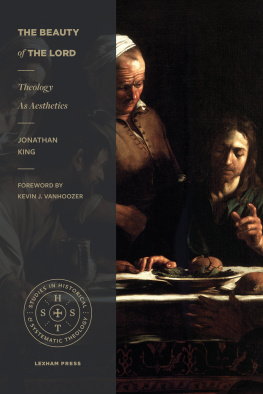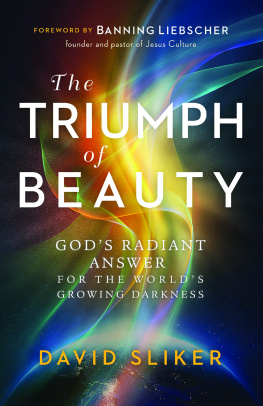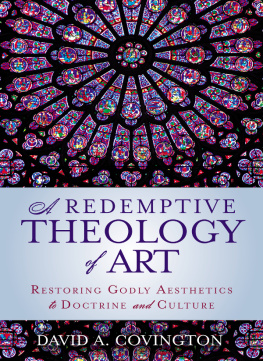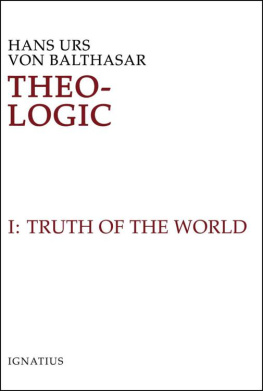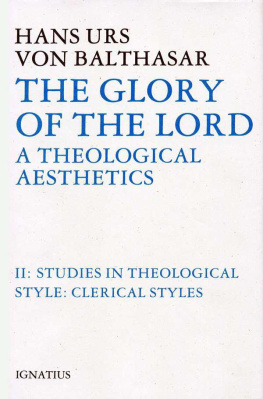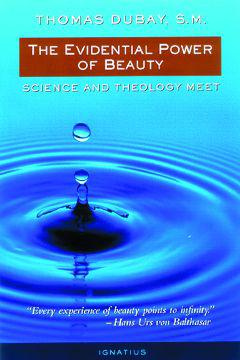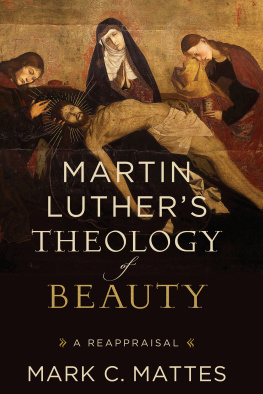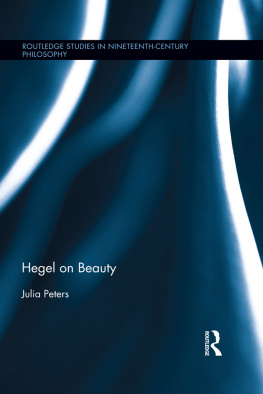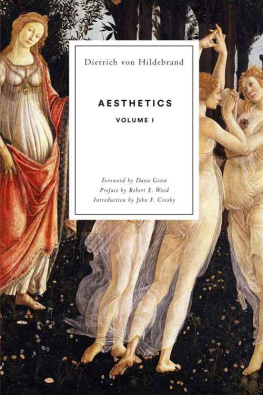THE BEAUTYof theLORD
Theology as Aesthetics
JONATHAN KING
STUDIES IN HISTORICAL AND SYSTEMATIC THEOLOGY


The Beauty of the Lord: Theology as Aesthetics
Studies in Historical and Systematic Theology
Copyright 2018 Jonathan King
Lexham Press, 1313 Commercial St., Bellingham, WA 98225
LexhamPress.com
All rights reserved. You may use brief quotations from this resource in presentations, articles, and books. For all other uses, please write Lexham Press for permission. Email us at .
Scripture quotations marked ( ESV ) are from ESVBible (The Holy Bible, English Standard Version), copyright 2001 by Crossway Bibles, a publishing ministry of Good News Publishers. Used by permission. All rights reserved.
Scripture quotations marked ( NEB ) are from the New English Bible, Copyright Cambridge University Press and Oxford University Press 1961, 1970. All rights reserved.
Scripture quotations marked ( NET ) are from the NET Bible copyright 19962006 by Biblical Studies Press, LLC. All rights reserved.
Print ISBN 978-1-68-359058-3
Digital ISBN 978-1-68-359059-0
Lexham Editorial Team: Todd Hains, Jennifer Edwards, Michael Haykin

To my wife, Sharmthe Lords precious gift to me.
You are my muse in all things beautiful, but more than that,
the whole of my life with you is incomparably better than
the sum of our lives individually, and that is a dimension
of beauty I am so blessed to experience because of you.
Contents
Of the three medieval transcendentals, beauty typically takes third place in modern theology, behind truth and goodness. Many systematic theologies set forth the truth of Scripture; liberation theologies focus on the importance of doing what is good and right, especially pursuing justice, but few have taken up the cause of beauty. Many Christians associate beauty with a concern for aesthetics. And yet, while they would not deny that art and music and perhaps even architecture enhance worship, when the budget gets tough, the arts get cut.
Jonathan Kings book is not about the arts. It is not about the beautiful things humans create in a variety of media (i.e., a theology of the arts). It is not about the beauty of the natural world (i.e., a natural theology of beauty). It is not an exercise in theological correlation (i.e., theology and the arts). Rather, it is a dogmatic account of the beauty of the Lord (i.e., it is a proposal about the doctrine of God). Beauty is not merely in the eye of the beholder (this way modern subjectivism lies); rather, beauty is in the being and activity of God, rooted in the divine attributes. Accordingly, King focuses on the beauty of the plan of God, the unified history of redemption recounted in the Scriptures and enacted in the history of Jesus Christ.
The main strength of this bookindeed, its peculiar beautylies in the way King unpacks the objective beauty of God in a threefold manner, namely, in terms of (1) Gods own immanent triune life, (2) the display of Gods own beauty in his external work, the economy of redemption that encompasses creation, salvation, and consummation, and (3) the person, work, and benefits of Jesus Christ, as the climax and coherence of the whole economy.
This work appeals above all to the person and work of Christ as the objective anchor to our understanding of beauty. In particular, King suggests that fittingness with the history of Jesus Christ is the biblical criterion for discerning the beauty of the Triune Lord (Eph 1:10). We know that the cross of Christ defines Gods love and wisdom, and the fittingness of Jesus death suggests that the cross, like everything God does, has its own peculiar beauty as well.
What I most appreciate and admire in this book is the way it unfolds the beauty of the Lord from Genesis (creation) to Revelation (consummation). Indeed, King is most persuasive in showing how protology anticipates eschatology and how eschatology recalls protology. This is a biblical theology of divine beauty that provides a beautiful frame for the portrait of beauty incarnate: the gospel of Jesus Christ. To put it in terms of the Gospel of Luke: And beginning with Moses and all the Prophets, he interpreted to them in all the Scriptures the things concerning the beauty of the Lord.
I also appreciate and admire the way in which King keeps his eye on disciple-making. Though the present book may have started out as a doctoral dissertation, its significance goes far beyond the academic. This is the kind of theology that edifies the church. While many theoretical discussions about certain far-flung doctrines may be hard to relate to the everyday life of the Christian, this discussion of Gods beauty is different. Sound doctrine is always salutary, but it does not always stir the heart. By way of contrast, this study of the beauty of the Lord aims not only to give the reader right understanding but also right heartedness: a right perspective on and a passion for the fittingness of Gods plan of redemption.
If the church is the temple of God, then edification is not unrelated to beautification. King sees that disciples are called to become little Christs, that is, to embody the truth, goodness, and beauty of Jesus Christ as they conform their spirits to his. The point of focusing on the beauty of the Lord is to inspire readers to live fittingly at all times and places as followers of Jesus Christ, to the glory of God. That is beautiful indeed.
Kevin J. Vanhoozer
My initial inspiration to explore the area of theological aesthetics really started as an initial curiosity during my final year and a half at Westminster Seminary California to try to understand how beauty pertains theologically to the core doctrines of the Christian faith. I am grateful to my professors at Westminster, Michael Horton and David VanDrunen, for granting me the latitude to explore the theology of Hans Urs von Balthasar in the research papers for my systematic theology courses. My curiosity to better understand beauty from a biblical and theological perspective became the key driving motivation for my pursuing this as the area of my doctoral research.
I am in debt to numerous persons who were so vital to my improving upon this project. I wish to express my deepest thanks to my doctoral advisor and mentor, Kevin Vanhoozer, whose insight, feedback, guidance, and modeling of Christian character and scholarship has been invaluable to me. I am likewise grateful to Graham Cole; I have learned and benefitted from his Christian wisdom. A number of friends deserve special mention as well. In particular I am grateful to Scott Harrower, Paul Manata, Hans Madueme, Brannon Ellis, and Jared Compton who served as trustworthy and tremendously helpful discussion and sparring partners for me. Their criticism, advice, and encouragement during the stage of my doctoral research remains imprinted on the substance and quality of this revised and expanded work. Beyond these, I also want to express my appreciation to Geoff Fulkerson, Jason Stanghelle, and Chris Donato whose camaraderie was a regular staple of intellectual sharpening and refreshment while I was completing my research and teaching at Trinity Evangelical Divinity School. The editorial process went exceptionally smooth in readying this book for publication. My sincere thanks to the editorial team at Lexham Press, and most especially Todd Hains, for not making my life harder than it otherwise might have gone, and for turning my work into such a beautiful book. Last but not least, I want to express my deepest love and gratitude to my wife Sharm, my precious companion and greatest encourager.

